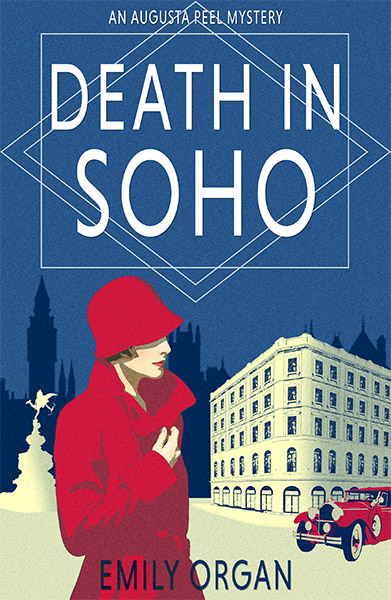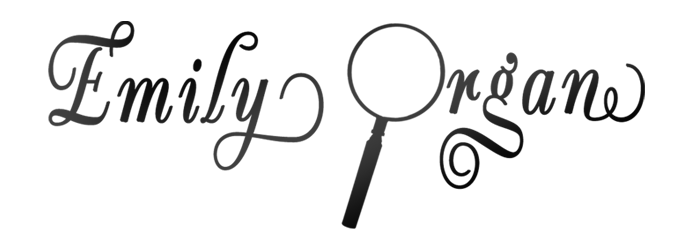
It’s the Roaring Twenties. London’s bright young things are partying, Soho’s nightlife is buzzing and Augusta Peel is hiding in her basement.
She has a reason to hide there: it’s home to her Bloomsbury workshop where she repairs old, neglected books. After a busy time during the war, all Augusta wants is peace and quiet – even if it is routinely disturbed by the tube trains beneath her feet.
But events take a turn when Augusta agrees to chaperone 19-year-old Harriet Jones on a date. Failing to get her home on time, she ends up in a riotous nightclub. She can’t imagine the evening getting much worse when the police raid it. But then the murder happens.
Who shot Jean Taylor? An old acquaintance at Scotland Yard learns Augusta was near the murder scene and persuades her to help with his investigation. But how can a humble book repairer navigate Soho’s world of actresses, gangsters and theatre impresarios to discover the truth?
Death in Soho is available as ebook, paperback and audiobook.
Book 1: Death in Soho
Book 2: Murder in the Air
Book 3: The Bloomsbury Murder
Book 4: The Tower Bridge Murder
Book 5: Death in Westminster
Book 6: Murder on the Thames
Book 7: The Baker Street Murders
Book 8: Death in Kensington
Read an excerpt from Death in Soho “Oh, bother!” Augusta stooped down and gathered up the scattered pages from the linoleum floor. The spine of the book had ripped as she was taking it down from the shelf and the front cover had come off completely. She arranged what remained of Thomas J Shepperton’s Collected Poems on the table and sighed. The poor poet would be terribly disappointed if he could see the state of his book now. Augusta angled her light and examined the pieces. The binding could be restitched, and the spine and cover would be straightforward to repair. Perhaps there was life in the Collected Poems yet. The volume was slim and the loose pages revealed Shepperton’s fondness for singing shepherdesses, spring flowers and West Country sunsets. All very pastoral, she thought. What would he make of this chilly basement workshop on a plain shopping street in the heart of Bloomsbury? A knock sounded at the little window set high in the wall, and beyond it crouched Dorothy Jones at street-level. Augusta could see only a pair of sturdy shoes, a green frock and a plump, waving hand, but she knew it was her friend. As Dorothy returned to full height and prepared to make her way down the steps, Augusta returned her attention to the book. Why is the collection so slim? Were these the only poems worth collecting? Or is there a second volume? The book had been abandoned in the luggage rack of a train en route to Euston. Had it been damaged by the repeated reading of an ardent fan? There was no name fondly written inside the cover, stating anyone’s claim to it. Perhaps it was mis-mistreated by a reluctant scholar; knocked about in the satchel of a disgruntled schoolboy before being abruptly hurled onto the rack of a busy carriage, never to be studied again. The doorhandle turned and Dorothy stepped inside. “Oh, it’s always so dingy in this place!” She rubbed her spectacles with a gloved finger, walked over to the workbench and plonked her shopping basket down on it. “I don’t know how you spend so much time down here. It’s as if you’re hiding away from the world!” “Something like that.” “It’s actually quite a nice day outside. Not bad for October, at least. I don’t suppose you’ve been out much today.” Dorothy pulled three books out of her basket. “These have seen better days. Mr Graham wants Alf’s Button repaired quickly, as it’s proving very popular at Holborn Library. We’ve two copies, but the other hasn’t been returned on time. I’ve sent a letter to the borrower. I’ve also got Great Expectations here and One Thousand and One Nights.” She paused as a low rumble made the walls and floor tremble. “There goes another tube train. We’re between Russell Square and King’s Cross here, aren’t we? Augusta nodded. “Funny to think of all those people travelling beneath our feet!” Dorothy continued. “I don’t know how you put up with the noise. Anyway, let me know how long it’ll take you to fix the books. I’ll need to tell Mr Graham.” She checked her watch. “Do we have time for a…” “Cup of tea?” “That would be lovely.” Augusta led the way up the steps to the street, wondering why Dorothy had chosen to work in a library when she liked to chat so much. They stepped through the door, which adjoined a tailor’s shop, then up the three flights of stairs to her little flat on the top floor. “You still have the budgerigar, I see,” said Dorothy, stepping across the room to examine the yellow bird in its cage. “Canary. And not just an ordinary canary; it’s a prize-winning bird.” “What did it win?” “Lady Hereford explained it once, but I can’t recall the detail now.” “Goes on a bit, does she?” “I think she gets lonely.” “Well, anyone would get a bit lonely living all on their own in a hotel. Especially a widow… I know all about that. Not that I live in a hotel, of course. It must cost an arm and a leg to stay there. She and her husband had that enormous estate before the war, didn’t they? Life must have been quite different back then. Still, I suppose she’s had plenty of people to talk to since she’s been in hospital. A captive audience, I’d say. Hopefully she’ll be out again soon so you can give the bird back. Doesn’t the cage take up an awful lot of space? Very fancy, too! It’s the same shape as the Taj Mahal. Actually, it’s not the Taj Mahal; it’s the Brighton Pavilion. Have you ever been there? It feels like you’re in India. A little budgerigar in an enormous Indian palace!” She gave a low chuckle. “Canary.” “I haven’t told you about Harriet’s bit of excitement the other morning yet. She helped Lord Shellbrook after he crashed his car in Piccadilly Circus. Did you hear about it?” “Harriet was there?” “Yes, she was taking an early morning walk before breakfast. I don’t know what she was doing down by Piccadilly Circus… perhaps she wanted to catch a glimpse of the statue of Eros. She certainly got more than she’d bargained for when she saw Lord Shellbrook plough directly into it! He was lucky someone happened to be close by and raised the alarm! Not that he was seriously hurt, anyway. I suspect the only real injury was to his pride. Besides, he was probably drunk. Speaking of Harriet, I have a favour to ask.” “Chaperone duties?” “I’m afraid so. They intend to visit a restaurant on Wednesday. Do you mind? You really would be doing me the most enormous favour again. You know how I worry.” “Is it that theatre manager again?” “Yes, Gabriel Lennox. I suppose I should be flattered he’s taken such an interest in her, but it’s placing a terrible strain on my nerves. I know all about the kind of flashy girls you find in the West End these days.” Her brow creased. “And not just the West End; all over London. Loose morals, extravagant habits and…” she lowered her voice, “cocaine, too.” Augusta set the cups down in their saucers, listening silently as Dorothy chatted away. “I know I shouldn’t keep harking back to the tragic case of that actress, Billie Carleton, but I’m afraid I can’t help it. Dead at just twenty-two after taking that horrible stuff. Can you imagine if it happened to your daughter?” “I can’t imagine it happening to Harriet.” “Well, neither could I until a short while ago. But those dancers and actresses are just the sorts of people she’s been carrying on with since she met Mr Lennox!” “Harriet’s a sewing mistress, not an actress or a dancer.” “There’s still time.” Dorothy shuddered. “And that’s why I’m so old-fashioned and insist on her having a chaperone. She would never agree to me chaperoning her, and you’re the only other lady of a certain age I trust. If my Christopher were still here…” She pursed her lips and drew a shaky breath in through her nose before recovering herself. “If my Christopher were still here, Harriet would behave properly.” “I’ve no doubt Harriet would be stepping out with Gabriel Lennox even if Christopher were still here. She’s young, and London’s an exciting place. Surely you wouldn’t want her to grow old and sensible too quickly.” “I’d be perfectly happy if Harriet grew old and sensible right away! What’s your opinion of Lennox? Do you think he’s a good sort of chap?” Augusta pictured the lascivious, red-haired braggart. Hardly an ideal match for young, naive Harriet. “I don’t know him well enough to pass comment.” “What does your instinct tell you?” “That the relationship will be short-lived.” “That’s a relief, I suppose. He has some impressive accomplishments under his belt, mind you. It was his theatre that put on The Maid From the Orient. Did you know that it was the longest-running play in the West End?” “Yes, I’ve heard all about it.” “It provided wonderful entertainment for all the servicemen on leave from the front. Shows like that were just what we needed during those dark days.” Half an hour later, Augusta watched from her window as Dorothy’s squat form bustled off down Marchmont Street. “I want Harriet home by eleven,” she’d said just before she left. “And whatever you do, don’t let her go anywhere near those awful nightclubs.” Augusta noticed a man in a trench coat standing outside the draper’s shop, his face hidden beneath the brim of his hat. He seemed familiar somehow. He lit a cigarette, then looked up at her window. Startled, Augusta stepped back. It was him. Surely he couldn’t have found out where she lived…
